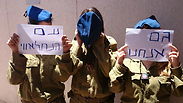
IDF must put an end to virtual protest
Analysis: If from now on every military or political issue provokes an online protest from soldiers, Israeli army's power of deterrence will pay a heavy price.
IDF soldiers are stationed at weak points on the seam line between the Jewish Quarter and Palestinian Hebron, and are doing their job as they are caught between the devil of the orders they received from their commanders and the deep blue sea of provocations carried out by those whose entire goal is to get an incriminating photo of an IDF fighter and distribute it worldwide.
Whoever puts the soldiers in these situations is treating them unfairly. The IDF itself must make sure that the manner in which soldiers are stationed in Hebron will not expose them to a confrontation with the provocateurs. In other words, they should operate from a stand which will prevent them from being caught up in distress which requires them to cock a weapon in front of a Palestinian.
It's important to remember these facts when we come to judge the mass Internet protest IDF soldiers and Israel Police officers have been participating in since Wednesday morning, against what mistakenly appeared at first as the soldier's dismissal because he cocked his gun at Palestinian teenagers.
There is no doubt that participating in such a protest group seemingly contradicts the IDF discipline and military ethics. In the 1980s it would have been considered as incitement to revolt, and soldiers have been tried and put in jail for much less than this. The fact that thousands of soldiers are involved this time, rather than just a few, does not make this protest acceptable and legitimate.
But essentially, because of the circumstances under which the video was shot and the provocation which is clear to anyone, one can understand the feelings of the soldiers who posted their protest pictures on the Facebook page "I support David the Nahal soldier."
But although the emotions are understandable, we must remember that this could negatively affect the IDF. If this is a one-time protest – so be it. But if from now on every military/political issue will provoke such an Internet protest from soldiers, the IDF's power of deterrence will pay a heavy price.
Confusion and bad management
What complicated the affair was the public and careless handling of the cocking incident. It took place some time after the soldier threw a stone at his commander and already knew that he was facing dismissal from the regiment, and likely detention as well, which certainly contributed to his apparent restlessness. Whoever sent a lone soldier to a checkpoint where he is exposed to provocations after such an incident did a very unwise thing.
The IDF spokesperson played a part in this affair when he failed to mention immediately the fact that the soldier was dismissed because of the violent incident at the regiment, creating the impression that he was punished for cocking the weapon, an incident which had not been properly investigated yet. In other words, this was a combination of confusion and bad management which led to a result serving as an unpleasant precedent.
This is where we go back to the problematic mass response of soldiers in uniform on Facebook. As this phenomenon could spread and turn into a habit, the IDF must deal with it and make it clear to the soldiers that any such move on the social networks will lead to serious punishment even if a large number of soldiers are involved.
The IDF can ignore the current incident, but it must clarify to the soldiers that such conduct harms its power of deterrence and could develop into phenomena which will be exploited by Israel's enemies.
In fact, this is what happened this time. The IDF spokesperson's mistake led to the exact outcome the pro-Palestinian provocateurs wanted to achieve: A virtual protest of the IDF soldiers facing them and dealing with them. It doesn't matter that the virtual protest was in solidarity with the soldier: The important thing is the conflict between the IDF and its soldier.
Everyone should remember that in any event, there is one outcome: Weakening the IDF's deterring image in the eyes of those surrounding us. At a time when the Middle East is in a state of instability, this deterring image is a vital security need.










